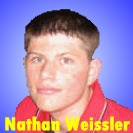The Promised Land
by: Nathan Weissler

"…I've seen the Promised Land. I may not get there with you.
But I want you to know tonight, that we, as a people will get to the Promised
Land." These words were spoken by Dr. Martin Luther King Jr. in what would be
his final speech--the evening before his 1968 assassination. King's language is
remarkably similar to that of the biblical Moses. Indeed, King was viewed by
many in the modern American Civil Rights Movement as Moses leading his people to
the Promised Land. As part of this effort, King worked closely with the Jewish
Community.
A famous photograph from the Civil Rights era is that of Dr. King and Rabbi
Abraham Joshua Heschel marching side by side in Alabama in 1965. Indeed, King
and Heschel's friendship is legendary. In March 1968, shortly before his
assassination, at the invitation of Rabbi Heschel, Dr. King addressed the annual
convention of Conservative rabbis. The rabbis even sung We Shall Overcome in
Hebrew. Additionally, Dr. King was planning on attending a Passover Seder with
Rabbi Heschel's family in 1968 but was assassinated shortly before Passover that
year.
Other Jewish friends of Dr. King included Stanley Levison who managed the New
York offices of the Southern Christian Leadership Conference (SCLC) of which Dr.
King was President. Another Jewish friend was Rabbi Israel Dresner who
participated in the Freedom Rides of 1961 and got arrested in Tallahassee,
Florida, along with three other rabbis. In response to accusations that he was
an outsider interfering in Southern life, referring to the Holocaust, Rabbi
Dresner responded, "Yet had someone--an outsider--interfered, there would not be
six million dead." The rabbi added that, "…what is happening in the South
is…evil within the American and Judaic tradition." Dr. King was also friends
with Rabbi Maurice Eisendrath who served as President of the Union of American
Hebrew Congregations (UAHC) in addition to Jewish attorneys Harry Wachtel,
Morris Abram and Jack Greenberg.
Another Jewish friend was Atlanta Rabbi Jacob M. Rothschild. Rabbi Rothschild
was an outspoken advocate for civil rights. Indeed, on Yom Kippur in 1948, he
condemned the “growing race hatred that threatens the South.” In October 1958,
Rabbi Rothschild’s Atlanta synagogue was bombed. Shortly thereafter, a Christian
minister declared, “It is a sin to destroy a house of God. It makes no
difference that the members of this house are Jewish.”
Dr. King also advocated for Jewish rights in the Soviet Union. In defence of his
position, King said, "We in the civil rights movement have repeatedly made clear
our commitment to the freedom of all men regardless of color, race, or creed. In
light of this principle we deplore anti-Semitism as we deplore discrimination
and segregation in Mississippi and Alabama."
Dr. King also frequently expressed admiration for the modern State of Israel. He
stated during the Israeli-Egyptian War of 1956, "There is something in the very
nature of the universe which is on the side of Israel in its struggle with every
Egypt." Finally, we should all understand a quote from one of Dr. King's last
speeches, "Anti-Semitism is as vile and contemptible as racism. Anyone who
supports it, including African-Americans, does a disservice to his people, his
country and his God." Indeed, MLK not only appreciated but made his life’s work
what Judaism calls b’tzelem elokhim (“all people are created in the image
of God.) Thus it is part of our responsibility as Jews and citizens to continue
Dr. King’s struggle as part of our struggle for Tikkun Olam (“Healing the
World.”) May the dream continue!
For more information, read a letter Dr. King wrote on the issue of anti-Semitism
in his day:
Here